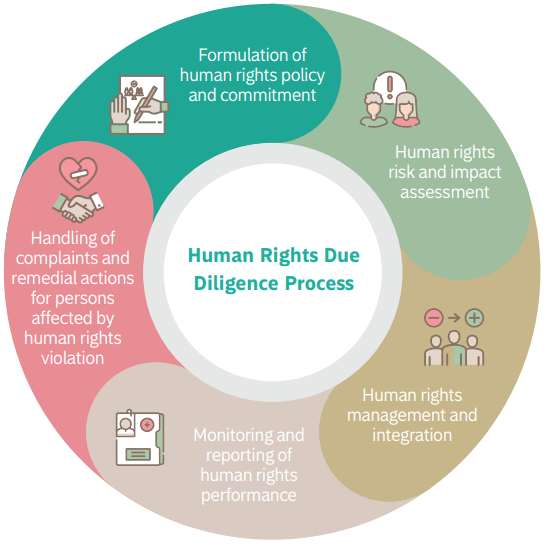Human Rights Due Diligence Process
The Bank conducts human rights due diligence covering all groups of stakeholders including vulnerable groups such as female employees, child workers, migrant workers, daily wage workers, minorities, people with disabilities, LGBT people, etc. The human rights due diligence process involves identifying human rights risks in business operations across the Bank’s value chain, considering those who may be affected by human rights violations by the Bank and related parties, assessing human rights risks, identifying human rights risk mitigation measures, and developing remediation actions for those affected by human rights violations. The Bank conducts and reviews its human rights due diligence process every three years. The most recent human rights due diligence process was conducted in 2022 and the result is published on the Bank’s website.

Labor Practice
The Bank respects the rights of employees and treats all employees equally without discrimination on the grounds of gender, race, religion, education, skin color or sexual orientation. We strictly comply with labor laws and internal rules and regulations including those relating to employment, working conditions, compensation, welfare, and occupational health and safety in the workplace. We also reject all forms of
harassment whether verbal, physical or sexual, which could lead to psychological or physical damage. The Bank places importance on promoting gender equality by providing equal and fair opportunities for skills and knowledge development and career advancement. Meanwhile, if the Bank is obliged to terminate a contract with an employee, the Bank will conduct the termination in line with labor law processes, while also complying with regulations regarding termination of employment by paying severance as required by law and a family allowance according to the Bank’s policy, which goes
beyond the statutory benefits.
Complaints Management
The Bank promotes equal and fair treatment of employees so that employees have good physical and mental health, as well as good morale and encouragement to work, and are able to develop themselves to their full potential. The Bank provides channels for complaints related to working conditions, unfair discrimination at work, and other forms of
intimidation or harassment whether it is verbal, physical or sexual harassment. Employees can file complaints in writing to the Employee Relations Unit under the Human Resources Department, which then submits them to a committee assigned to investigate complaints which rules on whether the alleged wrong doing has indeed occurred. If it is found that the treatment has been unfair, the case will be referred to the Audit and Control Division to consider appropriate disciplinary action and punishment The penalty for wrongdoers is based on the severity of the case, ranging from verbal warnings and pay cuts to termination of employment and legal action. The Bank ensures that all parties are treated fairly during the process and affected persons are remedied properly and fairly. In cases where the related parties disagree with the punishment, they can appeal to the
Disciplinary and Petition Committee to make a final decision.
Supply Chain Management
The Bank has issued a Supplier Code of Conduct, which
is the guidelines that the Bank expects all suppliers to conform to. The Supplier Code of Conduct covers various human rights issues such as labor rights, community rights, personal data rights and intellectual property rights. The Bank consistently monitors suppliers to ensure compliance with the Code of Conduct and promptly provides them with advice so that they can strictly follow the suppliers’ code of conduct.
Furthermore, respect for human rights is one of the topics that the Bank uses in our ESG assessment for suppliers. Suppliers must meet the assessment criteria set by the Bank before they are allowed to participate in our procurement process. Respect for human rights is a material issue for the Bank to assess risks in its critical suppliers.
Lending Process Management
Under the Bank’s Responsible Lending Policy, we do not engage in lending to a business that uses child labor or forced labor, or that involves human trafficking. We also consider social and environmental risks and impacts, including community rights violation and labor rights violations from project finance. In situations where the projects under consideration may potentially cause severe ESG impacts, borrowers must provide clear and adequate preventive measures and mitigation plans. Moreover, in the lending approval process, the Bank conducts background checks on customers to see if they have been prosecuted for human rights or environmental violations. This information is used by the Bank in considering a loan approval.

